Becoming global citizens, part 1
Many young people start their journey toward becoming global citizens at Luther. Luther courses emphasize engagement with the wider world, and nearly 90 percent of our students study away. On top of that, our student body includes people from 70 countries, which enriches the perspective and experience of the entire campus community. These things and more prepare a young person to shape and be shaped by the larger world.
After graduating, some alumni choose to take a next step and quite intentionally grow their exposure to other cultures and contexts by studying or teaching abroad. Some of them do this through the Fulbright Program.
Started in 1945 in the aftermath of World War II, the Fulbright Program is designed to build global goodwill through the international exchange of students and researchers. Elizabeth Steding, associate professor of German, works with Luther students, recent graduates, and faculty who are applying for a Fulbright. She explains, “During their time abroad, Fulbright recipients are informal ambassadors for the US, and when they return home, they share their knowledge of their host country with other Americans.”
This year marks the 75th anniversary of the Fulbright. It’s a highly competitive program, and Luther frequently ranks as a top-tier producer of Fulbright recipients. Here, some of those recipients share how their Fulbright experience has impacted their lives.
Tiffany Choi ’09
Then: Fulbright English teaching assistant (ETA) in the Paris suburb of Lycee Evariste Galois, 2009–10
Now: high school French teacher in Denver, Colo., with a master’s degree in culturally and linguistically diverse education. She also served as president of the Denver Classroom Teachers Association for two years.
How did your Fulbright experience shape the path your life has taken?
My experience with Fulbright solidified my career path toward public education. I learned that I loved working with teenagers and that I particularly loved inserting the arts into my teaching.
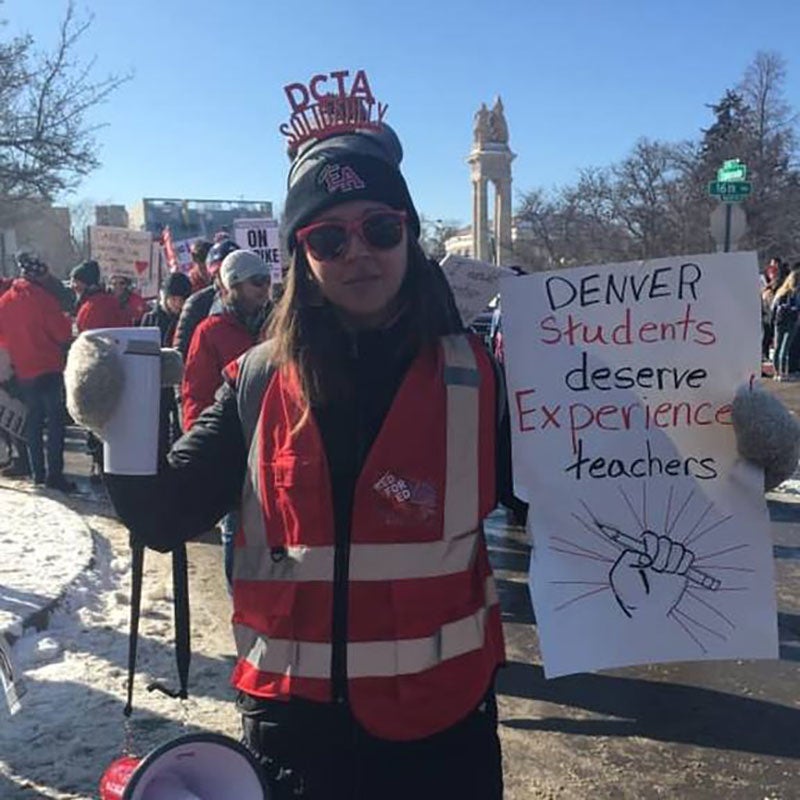
Tiffany Choi, who served as president of the Denver Classroom Teachers Association, was strike captain during the 2019 Denver teacher strike.
How did it shape your perspective?
Seeing a public education system different from our American system made me more critical of our own system and drove me to work toward better education policies locally.
Karin Maxey ’07
Then: ETA in Kamen, near Dortmund, Germany, 2007–8
Now: works at the University of Chicago Language Center
Tell us more about what do you now.
After my Fulbright year, I earned my master’s degree in German from the University of Illinois at Urbana-Champaign in 2010, and in 2014 I completed my PhD in German and applied linguistics from the University of Texas at Austin. After I graduated, I spent six years teaching German and first-year writing for English learners at Vassar College and Northeastern University. Now I work at the University of Chicago Language Center, where I offer professional development opportunities for language instructors, plan workshops related to all aspects of language curriculum design, and coordinate many of our grant-related activities. My job now is definitely a twist on traditional teaching—now instead of being in the classroom myself, I support other language teachers, and I love it. Plus, I’m back in the Midwest again, where my heart is.
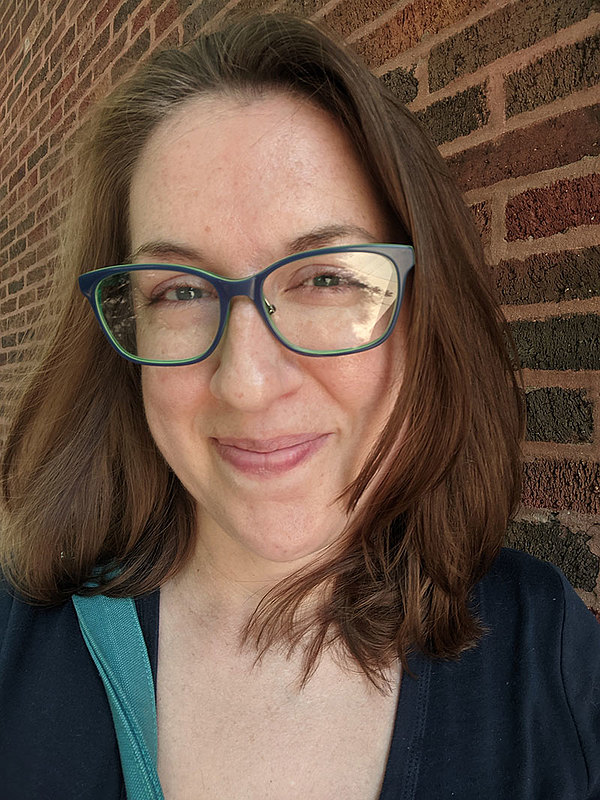
Karin Maxey
How did your Fulbright experience shape the path your life has taken?
Teaching in Germany, and receiving the mentorship of teachers at my school, was formative in my own career, because it confirmed that I really do like to teach. It’s also interesting to look at the teaching materials I developed during that time and see how far I’ve come in my understanding of language learning as well as curriculum and materials design (hint: it’s VERY far!). That year was also a vital pause for me between undergraduate and earning my MA and PhD in German, and a good opportunity for me to really enhance and refine my German abilities. Finally, teaching in Germany gave me a leg up when I had my own German class for the first time at the University of Illinois at Urbana-Champaign because I already had a little bit of teaching experience under my belt by then.
How did it shape your perspective?
Spending extensive time in another country was so important to me. It taught me not to make assumptions about how other people think or how they think things should work. It taught me to ask questions and to appreciate differences. I know that sounds a little cliché, but I feel like now I know these things on a much deeper level than I would if I had not lived and worked abroad. I also had relationships that existed entirely in German—it was such a confidence boost to know that my German was good enough to keep a friendship alive. This experience showed me in a very profound way that language isn’t just a thing you can put into a chart or a grammar book—language is for doing things and for connecting people. That perspective is still central to the work I do now.
James Feinstein ’11
Then: ETA in Thailand 2011–12
Now: senior policy manager at Arcadia, a climate tech company
What was a highlight or two of your Fulbright experience?
I had the opportunity to live with a host family in northeast Thailand. MaTu and her son, Ying, introduced me to countless facets of Thai culture including historical sites, local politics, delicious food, and karaoke. Getting to know two amazing people so well was one of my highlights. I still speak with MaTu and saw her in Washington, DC, last year.
Tell us more about what you do now.
I work for Arcadia, a climate tech company based in Washington, DC. Our mission is to help families access renewable energy and save money. As the senior policy manager, I work to shape and improve state and federal renewable energy policies. Prior to this I worked on energy and environmental policy for senators Tim Johnson and Heidi Heitkamp and also in the Obama Administration at the US International Development Finance Corporation (formerly OPIC).
How did your Fulbright experience shape the path your life has taken?
My Fulbright experience began in October 2011 when we met in Bangkok for crash courses in Thai language and teaching English as a second language. That month, Bangkok and the surrounding areas experienced terrible flooding that killed hundreds of people and caused billions of dollars in damages. While a number of issues were at play, it was evident climate change was a significant force multiplier. I witnessed the devastating consequences extreme weather has on frontline communities up close and personal. This experience motivated me to build a career around climate change.
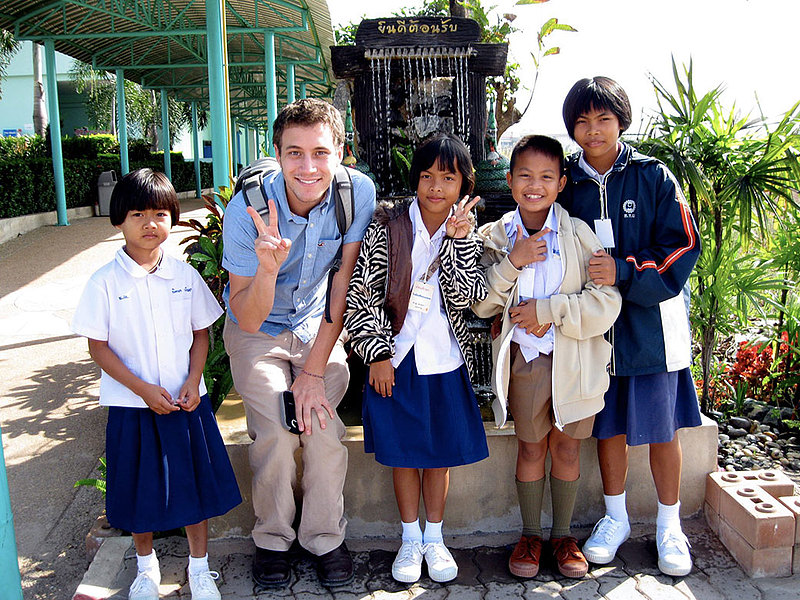
James Feinstein spent his Fulbright in Thailand in 2011–12.
Some of my best friends were made while in Thailand, including fellow Fulbrighters, Thai friends, and expats. Adding to that, when I returned to the United States I served on the board of the National Capital Area Chapter of the Fulbright Association. This opportunity introduced me to many Fulbrighters from around the world, some of whom became close friends. I couldn’t have met these wonderful people without an experience like Fulbright.
How did it shape your perspective?
During my time in Thailand, I learned there is no better way to learn more about myself or the world around me than through intimate conversations with people from different cultures. Learning what motivates people is really insightful, and I find that much easier to understand when living with people from other cultures. For example, at the familial level, seeing how a family from a different culture may interact, argue, love, and live together seems easier to understand than my own family or that of my neighbor’s. Having the opportunity to witness a family interact from this perspective has given me a more wholesome perspective of my own family and friends and how we interact, argue, love, and live together. Again this is one example, but similar experiences continue to influence many facets of my life. Ultimately, this has given me tools to be more understanding, more self-reflective, and more grateful for the positive things people do around me.
I also have an insatiable craving for Thai food.
Heidi Draheim-Shadbeh ’02
Then: ETA in Leinefelde, Germany, 2003–4
Now: first- and second-grade English teacher at the German International School in Portland, Ore.
What was a highlight or two of your Fulbright experience?
One of the best things during my Fulbright year was how much I got to travel! I was able to visit so many places both in Germany as well as other EU countries. I was able to travel as much like a “local” as possible. It was an incredible year that I still can’t believe was real!
Another highlight was all of the people I met that year. I was in a very small former East German city. Many people there had never met an American before. I was able to teach and show them all the great things about my country (real things, not just what they saw in the media), but I also got to learn about real life in East Germany before and after the fall of the wall, as well as live it myself. I lived with a multigenerational host family whose stories were fascinating.
I also spent time volunteering to lead an after-school English club at the local elementary school. I was a German and elementary ed major at Luther, so this was especially important to me as my main job that year was teaching older students. It was so much fun working with those kids who had only ever experienced Americans through the TV shows and movies they had seen. I still have all the cards they made me when I left and think about those kiddos often!
Another highlight happened maybe five-ish years after I returned to the States. One day after school a nanny was picking up one of my students, and she looked so familiar—she had been one of my students I taught English to during my Fulbright year! It was such a crazy, fun coincidence. She was inspired to make her own adventure in a foreign country just like I had and had landed not only in the same city I now lived, but with a connection to my current school too!
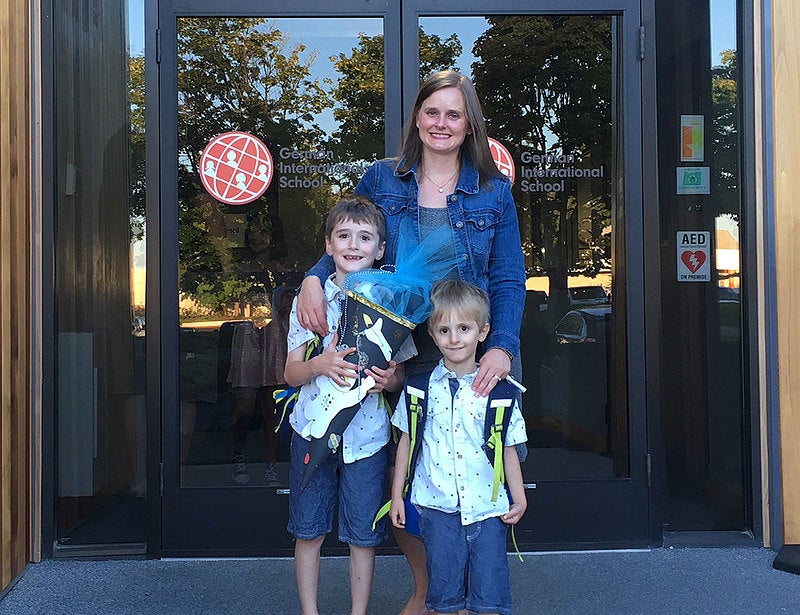
Heidi Draheim-Shadbeh spent her first Fulbright in Germany and now teaches at the German International School in Portland, Oregon. Here, she's pictured with her sons, both students at the school. Her oldest is holding a Schultüte, a beloved German tradition that sweetens the very first day of school for first graders.
Tell us more about what you do now.
I now teach first- and second-grade English at the German International School in Portland, Oregon. It is a German immersion school.
I have the best of all worlds with this job. I love getting to work with this age. It’s an IB school, so I get to incorporate lots of culture and fun topics into my teaching. Many of my colleagues and lots of my students and their families are also from Germany, so I still have that connection and get to keep my German skills sharp. I’ve been able to build an awesome curriculum at the school that I’m pretty proud of, and it is amazing to watch my former students now doing fantastic things—doing their own Fulbrights, becoming teachers themselves, coming back and helping me in my classroom, and getting out there and changing the world! It’s a small, close-knit community at GIS, and I love that alumni and their parents keep in touch. It’s been a very rewarding career.
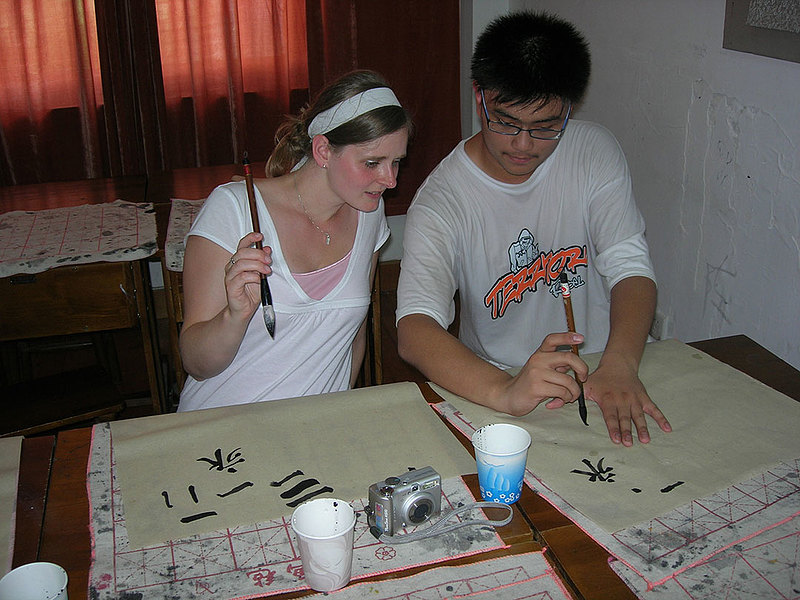
During her second Fulbright in China, Heidi Draheim-Shadbeh learned calligraphy at Changzhou Number 1 Middle School. Fun fact: her instructor was the Lego robotics world champion!
How did your Fulbright experience shape the path your life has taken?
Upon my return to the states after my Fulbright year, I gathered all my courage, moved across the country, took this job, and am still here! My year in Germany definitely gave me the confidence to make the decision to move to another place I had never been to, far away from all my family and friends. I went thinking I would stay a year or two, and now am married with two kids, a mortgage, and a deeply rooted life and fulfilling career here. My Fulbright year definitely positively shaped my future. There was never a question that German would play a pivotal role in my life after that, and it’s still true! My own two kiddos are fluent in German, and my husband is desperately trying to learn the language as well.
I loved living abroad so much that I applied for and was granted a Fulbright-Hays scholarship in 2007. It allowed me to be a part of a delegation studying how foreign languages were taught in China. I spent five amazing weeks in China, and my worldview was forever changed.
Betsy Fawcett ’17
Then: ETA in Kropyvnytskyi, Ukraine, 2017–18. She also stayed an additional year teaching in Kyiv.
Now: adult education instructor at Briya PCS
What was a highlight or two of your Fulbright experience?
This question is hard without being too cliché!
1. I taught many American culture classes. And in one of my classes, the students were very interested in Islamophobia. So I used my classroom experiences from Luther and a few Todd Green articles to teach about Islamophobia and then expand the conversation to talk about Islamophobia in Ukraine. It was cool to combine my Luther experience with my Fulbright, but then also to teach on a topic I didn’t know anything about (Islamophobia in Ukraine). My students and I studied that together!
2. The food in Ukraine was so good. I got to spend time with a family that “adopted” me a bit. When I went to their house, I never knew what I was eating, but it was always so good. It is honestly hard for me to replicate most of the food that I had in Ukraine. I try, but it doesn’t work!
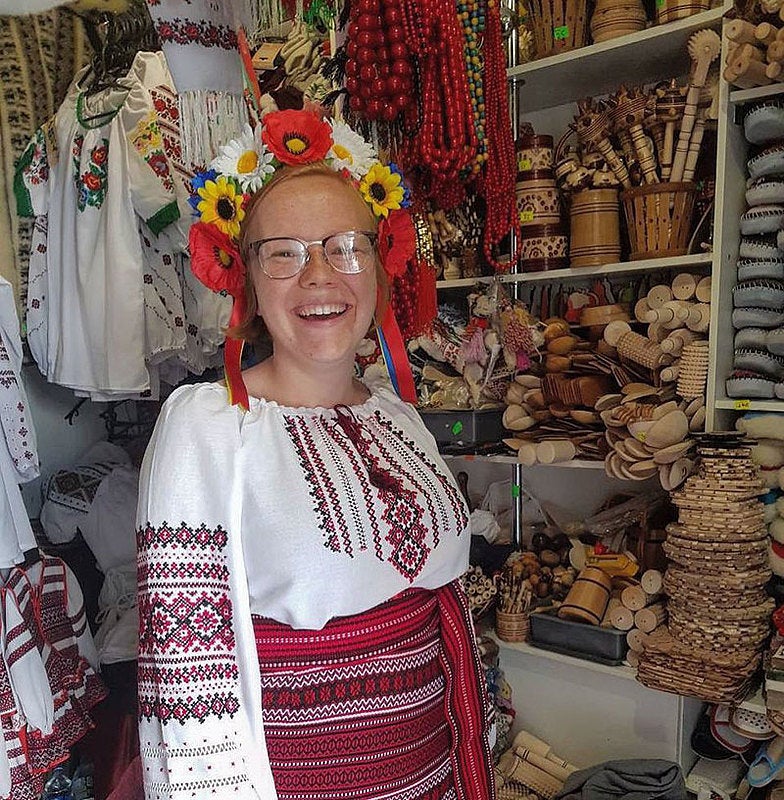
Betsy Fawcett spent her Fulbright in Kropyvnytskyi, Ukraine, 2017–18. Here, she's pictured in traditional Ukrainian clothes. The intricate pattern embroidered on her garment is called vyshyvanka.
Tell us more about what you do now.
Currently, I am an adult education instructor at Briya PCS in Washington, DC, teaching immigrants and non-native English speakers English, family literacy, and workforce skills. I have been at Briya for the last two years. This summer I began my studies at the Harvard Graduate School of Education, where I will be studying education policy analysis with a concentration in global, comparative, and international education. I chose Harvard because, in addition to having an amazing education program, they have a Ukrainian Institute. I made good friends with the Ukrainian institute last summer when I took a course with them and received the Senkowsky Prize for Academic Achievement. I am REALLY hoping to be able to connect with them more at Harvard. My academic interests and passion lie in understanding education reform processes in post-soviet countries and how these education systems are continuing to reform.
How did your Fulbright experience shape the path your life has taken?
My entire life, I said I would not be a teacher. But teaching encompasses so much more than what we casually think of classroom teaching. Teaching is about sharing, it is about connecting with people, and it is about finding a common language. Sharing, connecting, finding a common language—those are all things that I have been passionate about for years. Fulbright showed me this connection and showed me how much I truly do love teaching and the process of educating.
Without my experience in Ukraine, I am not sure if I would be doing this job that I love so much or continuing my education in a field that I find so fascinating and find so much fulfillment in. Truly I owe where I am now, and where I am headed, to my Fulbright experience.
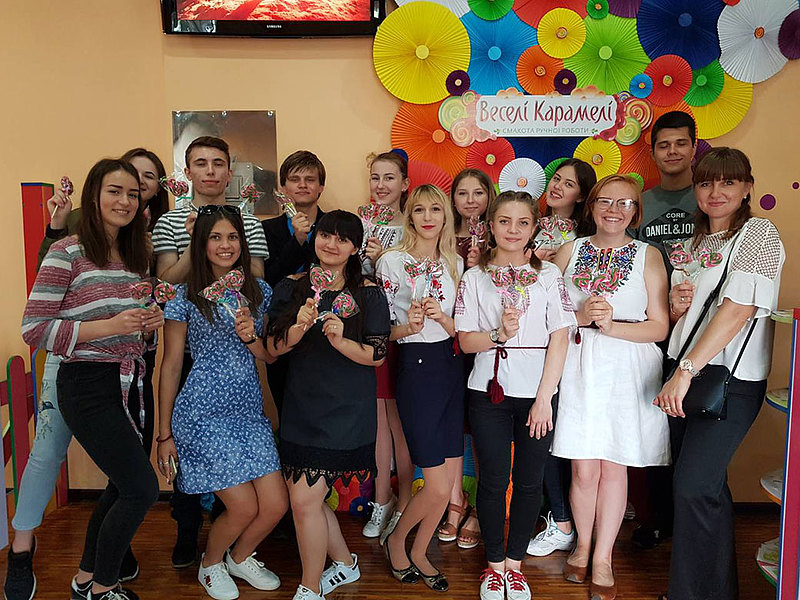
Betsy Fawcett with her high school students on a field trip to the candy-making store.
In addition, I have developed a deep love for Ukraine. People who have been to Ukraine, especially for long periods of time, often connect over this effect that Ukraine and its people have on you. On the surface, it is a bit of a harsh country for so many reasons, but the people, the culture, the food, the language, the politics—they just slowly dig a way into your heart. And pretty soon you find yourself in love with a country you barely knew about a few years before. Even now, two years later, Ukraine finds its way into my conversations many days, and I constantly think about when I will visit again (hopefully soon!).
Patrick Larson ’17
Then: ETA in Kardzhali, Bulgaria, 2017–18
Now: strategic planning healthcare consultant in Minneapolis and a volunteer on boards of the Special Olympics and the PACER Center
What was a highlight or two of your Fulbright experience?
I had the pleasure of teaching some truly talented and curious students who were excited to learn English and about the world. In addition to teaching English, I also coached the school’s basketball team and speech team. Both activities really enhanced my experience by allowing me to further connect with students outside of the classroom.
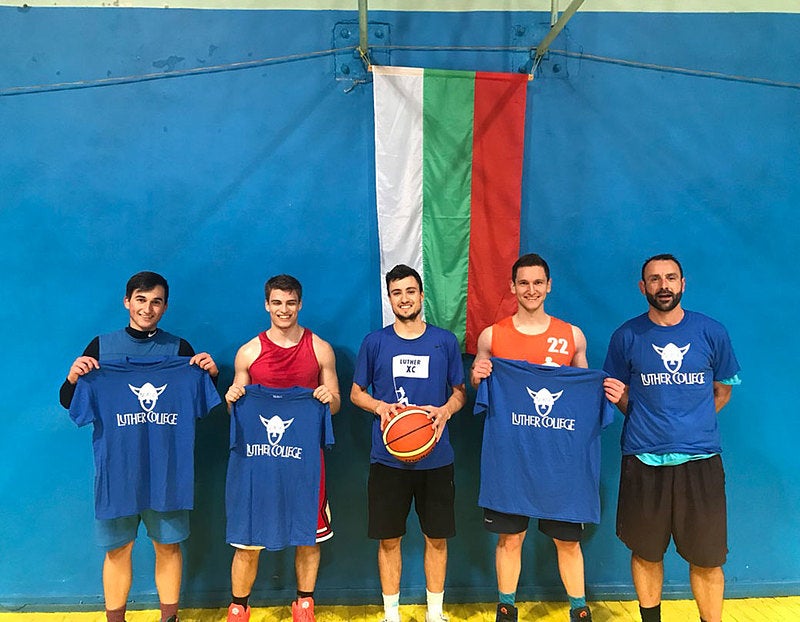
During his Fulbright in Kardzhali, Bulgaria, in 2017–18, Patrick Larson (center) coached his school's basketball team.
How did your Fulbright experience shape the path your life has taken?
My time in Bulgaria has only re-iterated my desire to continue learning about communities of people that are different from the one I grew up in. As a foreigner in a small Bulgarian town, I learned how to approach my new environment and people around me with empathy and compassion.
How did it shape your perspective?
When I arrived to Kardzhali, I immediately felt like an imposter in a town filled with people who looked and talked differently than I did. However, after a short amount of time it became clear how much I had in common with any given person I interacted with on a daily basis, despite our very different upbringings. While our world can be incredibly divisive at times, there are so many commonalities that we share as human beings regardless of where you live or what language you speak.
Ryan Fordice ’08
Then: ETA in Gaziantep, Turkey, 2011–12
Now: completed an MD at the University of Chicago, then worked as the Lutheran campus minister for the university, alongside fundraising work. Currently beginning a hospital chaplain residency.
How did your Fulbright experience shape the path your life has taken?
Fulbright infused my life with a wealth of incredible people and superlative experiences. It led directly to my graduate studies, which in turn led to the people and career that have defined my life since. It almost certainly affected the course of my life more than any other single event.
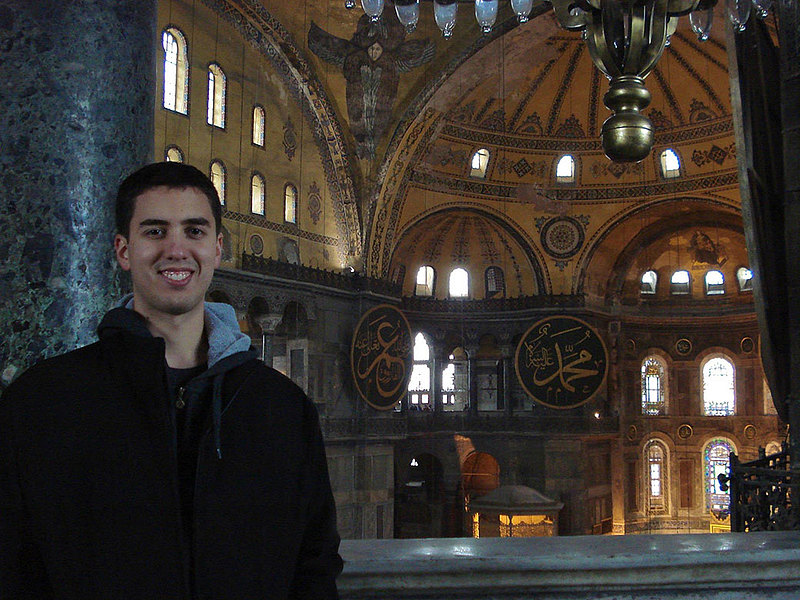
During his Fulbright in Gaziantep, Turkey, in 2011–12, Ryan Fordice traveled extensively, including to the Hagia Sophia.
How did it shape your perspective?
Being in Turkey and the ten other countries I was able to visit that year taught me how infinitely insignificant a part of the world we each are unto ourselves, but how infinitely significant we are in relationship to one another. The world is big, and full of good people waiting to meet.
Laura (Mohs) Hesse ’10
Then ETA in Bulgaria, 2010
Now: middle school social studies teacher
What was a highlight or two of your Fulbright experience?
I directed and produced a reduced version of Much Ado About Nothing in English with students from the school where I taught. The state theatre in my school’s town allowed us to use their theatre, and the show sold out.
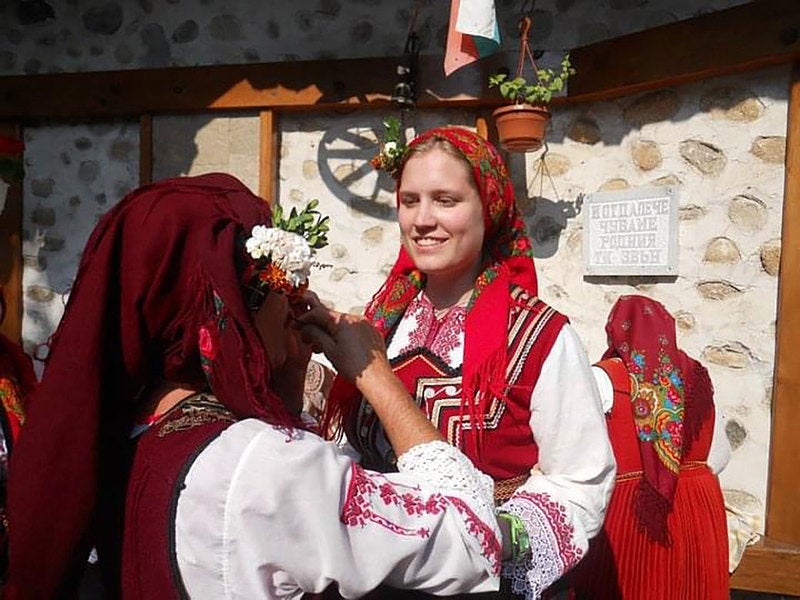
Laura (Mohs) Hesse, pictured here in traditional Bulgarian clothing, spent her Fulbright in Bulgaria in 2010.
How did your Fulbright experience shape the path your life has taken?
I learned that I really have an affinity and love for teaching. I already had a degree in secondary education, but my experience with Fulbright showed me that was really what I wanted to do. Spending time overseas has also really enriched my teaching and helped me bring more global examples and awareness into my lessons. Plus, my students love hearing all about my many adventures (and some laughable language errors) while abroad.
How did it shape your perspective?
I have become much more aware of the world beyond our borders. I used to think of everything as it related to the US, so it was really eye-opening to live my daily life somewhere completely different. It made me much more independent and open-minded to other people and other cultures. Fulbright made me a stronger and better person. I can‘t wait to take our two kids back to Bulgaria and show them where I lived.